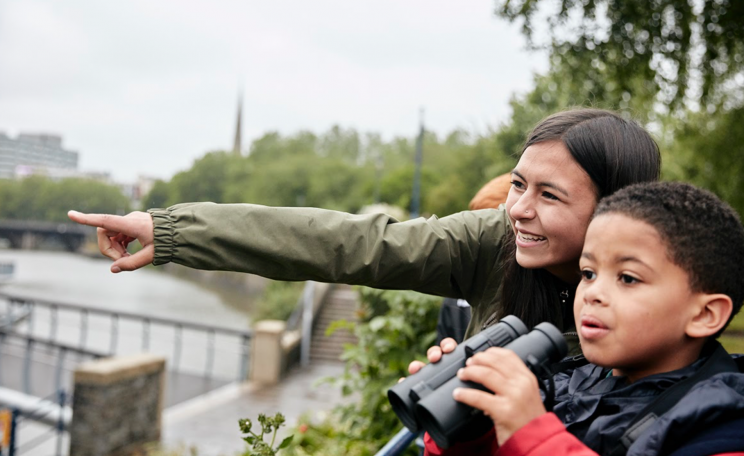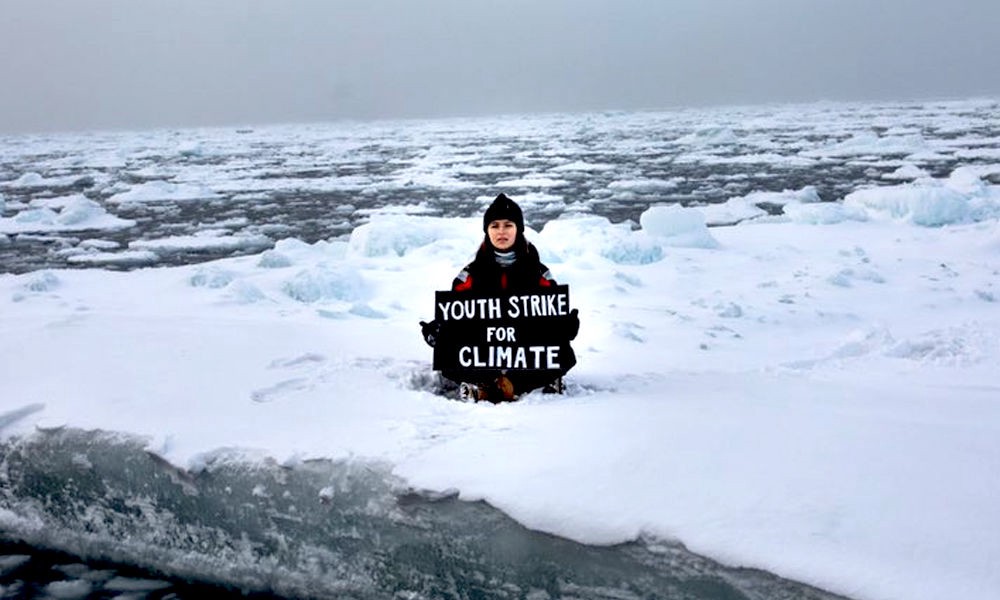*Originally published 29 November 2020*
November 30th: a day to commemorate and keep in our thoughts the hundreds of animal species that we have lost. This year’s theme is looking at anti-racism in the environmental movement.
Living Planet, a WWF report, stated that between 1970 and 2010 the population sizes of all amphibians, fish, mammals, birds, and reptiles fell by half on average. Some of our favourite and loved animals are down to their last hundreds and we are the major cause for it.
From all land used for agriculture, 77% is used directly and indirectly for animal agriculture. Rearing livestock and growing their food is the largest contributor to deforestation and the largest cause for endangered, near-extinct, and lost species.
I spoke with 18 year old ornithologist Dr. Mya-Rose Craig, also known as Birdgirl for her thoughts on our current structures surrounding the environmental conversation. Mya-Rose Craig is the youngest person to have seen over half the world’s birds. She will be featuring in the Writers Rebel event: On The Brink on 30th November for Lost Species Day.
_______________________________________________________________
Nice to meet you Mya-Rose and thank you for this interview! You promote and monitor bird populations and advocate for equal access to nature for all. Specifically, you campaign for young people from minority backgrounds to have better access to nature. To start, can you tell me where your passion and understanding for nature grew from and why it is important for people from minority backgrounds to be more involved in the environmental conversation?
My parents are really big on nature, I’ve always loved bird watching, I live in a very rural area — I’m very lucky in all of that. It’s always been a massive part of my life, especially birds. But I’m also half Bangladeshi and once I had that realisation that people from minority backgrounds weren’t engaging with nature or even thinking about engaging with nature I carried out more research showing me the problem there is. Diversity is important for the sake of diversity and bringing everyone’s ideas to the environmental sector. It’s also that people create that relationship with nature and wildlife for their mental and physical health.
My favourite part of the work I do is more on the ground and grassroots: taking young people from ethnic minority backgrounds on nature camps (Black2Nature). A lot of the time it’s the first time they’ve come out into the countryside or spent time in nature and it’s all about trying to ignite that passion in them I suppose. I think it’s extremely important because where we’ve got so many environmental crises at the moment, we’ve also got so many organisations and movements trying to build a better world. I think a movement like this can’t be properly sustainable or functional unless you have everybody getting involved and there is an understanding of what everyone needs from the movement.
Speaking of this, the theme for Lost Species Day is to look at how to embed anti-racism into environmental work. I understand that you are planning to work with indigenous groups in 2021, could you share what people in the environmental community could be mindful of in their work?
The issues surrounding indigenous people are still relatively contentious. For me, it’s been a long journey of education. My main goal is always to raise up the voices of the indigenous activists who are already doing things and give them that platform.
My issue with conservation organisations and indigenous people is that our blue print of conservation is based on American conservation about 150 years ago. So when people like John Muir and Roosevelt started national parks and removed native people from their land. Quite often there’s a complete lack of awareness and acknowledgment of the work they’re already doing and quite often indigenous people are quite poorly treated by these organisations. We wouldn’t be in the position we are today if they weren’t on the front lines doing all of the hard work. You have situations where indigenous people are pulled away from their land because Western organisations think they can do it better and that can be described as a modern-day form of colonialism. I believe that giving the people who are already doing the work the resources and money to continue is better. They need to be able to stand up for themselves against other local people, their governments, and globally.
People’s relationship with the land is really complex, contributing to both the environmental and racial catastrophes we find ourselves in. What are your thoughts on animal agriculture and species loss?
I find the relationship between agriculture and species loss quite interesting — I think the UK is one of the most biodiversity depleted countries, and I’ve been very lucky to be able to see quite a few countries. I think farmers have the ability to make or break biodiversity… and I do think there will be an opportunity post-Brexit. In terms of EU law, there was a lot in place that was extremely unhelpful to farmers, and right now environmentalists are creating much more positive relationships with farmers; the “us vs. them” relationship is decreasing which will help to increase biodiversity. Farming isn’t nature limping through our fields, farming can be amazing for nature and we should seize that opportunity.
Another focus of yours is to elevate bird populations. A recent Birdlife International study found that since the 1500s, we have lost at least 187 species of birds! Why should people care about this? Can you share any first-hand experiences?
In terms of my own experience, I’ve noticed quite a few. A big one is house-sparrows, which have massively decreased over my lifetime. But, another one I find really shocking (that wasn’t over my lifetime) is that starlings used to be a really common bird because other than when I’ve actively gone to see murmurations I actually don’t ever see starlings anywhere.
We are disrupting ecosystems and entire landscapes, we need to hand over the power back to nature to recuperate. I find it weird, I feel like humans have this innate need for preservation; things that other animals wouldn’t care about… like our history, culture, language and buildings — we want to hold on to them even if they are old and redundant or don’t serve us. People would feel about nature in this way, so personally, I find it so strange that people can be so casual about us losing nature and entire species. I feel like it goes against our natural human instinct. People should care about species loss because it’s sad, but more importantly because it’s our fault. We have to care to make sure it doesn’t keep happening.
As we’re talking about bird loss, something we hear about a lot is about domesticated animals, particularly cats, being a problem for bird populations in this country. Are there any solutions other than keeping cats indoors or keeping people from having cats? How devastating do you think they are?
I haven’t looked into this too much but I do think it’s a lot more complicated because as you said people are a lot more defensive about their pets. I do think cats cause a lot of issues in some ways… there’s literally a cat sitting under our bird feeder in the garden right now, and it comes there all the time. For me, a big way is to make sure you’re not laying traps for the cats. For example, I would always hang my feeders really high for smaller birds in places that cats can’t get to so you’re not helping them along the way.
But I think we see it as an issue because we already have a lot of issues with biodiversity. If we had a really flourishing country with loads of birds, people wouldn’t be so worried by the few birds a cat kills each year. It’s because we’re in such a strenuous position that it does feel like every bird counts.
I do think so too! Touching on what you said earlier about people caring and your organisation Black2Nature, do you think people don’t care so much about the environment and lost species because they are so out of touch with nature?
There have been a lot of studies to show that people do care about these issues but a lot fewer people are willing to change their lifestyle to help so I think a lot of people would support something that would help to recuperate wildlife if it didn’t affect their lifestyles… but we’ve gone past the point where that’s possible. If this was dealt with maybe 30 to 40 years ago that might have been an option but now we need to make a stark difference. I don’t believe in environmental individualism but I do think that big changes are needed to our lifestyle. We will have to start to acknowledge that our lives will start to change if we decide to save the planet and that does make a lot of people quite unhappy.

“Environmental individualism” isn’t a term that people come across often. Can you elaborate on that?
I’m very weary of pinning the blame of our environmental issues on individual people. A lot of people are having these conversations, about things like the carbon footprint. People are hyper aware of their actions and supposed impact on the environment. They try to do all the right things like cycling, recycling and being vegan, meanwhile, nobody is talking about the fact that the majority of climate change is not caused by everyday people. Even though it’s a good thing to do, the actions of individual people don’t have significant impacts on the environment, the more effective thing to do is combat these corporations who are causing such a large portion of climate change.
I feel like a bit of a conspiracy theorist when I say this but I do feel like there’s been a deliberate large campaign by these corporations to push this concept of environmental individualism… to deflect people’s attention away from the fact that we should be blaming people like oil companies. Even the popularisation of the term “carbon footprint” came from a think tank owned by one of these companies [BP] — its all absolutely controlled. We have to hold these corporations accountable instead of having lots of conversations about what individuals can do.
I definitely agree! We are seeing so many more young people taking it upon themselves to solve the climate mess we find ourselves in. Just last month you yourself took Greta Thunberg’s Youth Strike for Climate to the arctic. What would you say to young people who want to contribute to the environmental movement?
It’s really important to just go out and do, we often get stuck in the how-to-do but anything I’ve started out doing I’ve not known how to do it. I’ve learnt along the way and taught myself and become better at it over time. I’ve become an expert in the diversity and nature section now, but when I was thirteen I had no idea about it, I just knew there was a problem and I wanted to do something about it.
Using the Youth Strike for Climate protests is a good example, it was easy to copy and paste that in terms of what you need to do, organise, the social media, etc. and I think that’s why it spread so much. It’s not because young people suddenly decided they want to care about the environment but because it facilitated them to go out and show that they care about the environment.
I see a lot of people burn out and get exhausted and become ill. In the seven years I’ve been doing this I’ve seen so many people come and go because they put their everything in for a year or something but then they never want to come back to it. An important thing is to make sure you don’t burn out and look after yourself because otherwise you’re not capable of looking after the planet and other people.
A young woman I know locally started something called the Resilience Project and it’s all about giving that mental health support to young people as she became very sick herself. She wanted to make sure others didn’t go through that. And the fact there was a need for that in the first place says a lot. Young people feel the need to throw themselves into activism to such an extent for two reasons: (1) they’ve never done something like that — they are really passionate and want to do everything they can to help (2) but also because this is such an urgent issue which they realise and feel obligated to do everything they can, even if it is bad for their own mental health. We wouldn’t be in the position where we see so many young people fall sick if the responsibility had not fallen on their shoulders.
It drives me nuts when people say, “the young people of today are inspirational”. They’re not trying to be inspirational. They’re desperate, angry and upset. They want to make sure they have a liveable planet; that’s not inspirational, it’s sad.
In a book I’m writing right now I’m speaking to quite a few indigenous people and the thing I noticed is how young they all were when they saw environmental issues first hand and felt the need to do something about it. Some of them were seven-eight years old. At first, I was like, “oh wow that’s inspirational”, but when I thought about it I thought about how they’re twenty years old now, and they’ve lost their childhood fighting for their land.
I must say I’ve been guilty of saying the same, but you’re totally right. I’ve never seen it that way before! Well Mya-Rose, thank you so much for meeting online with me! You truly are an inspiration and have definitely got me thinking about a lot more than I came with!
__________________________________________________________________
SOCIAL MEDIA FOR INFORMATION
Writers Rebel Links:
- Event for Lost Species Day: https://www.eventbrite.co.uk/e/on-the-brink-tickets-128515073043
- Official Page: https://www.facebook.com/writersrebel/
Mya-Rose Craig Links:
- Official Page: https://www.facebook.com/myarosebirdgirlcraig/
- Black2Nature: https://www.facebook.com/OfficialB2N
Animal Rebellion Links:
- Linktree: https://linktr.ee/animal_rebellion
- Follow Animal Rebellion: Animal Rebellion
- Follow us on Medium: https://medium.com/animal-rebellion
- Keep the Movement moving. Fund Animal Rebellion: https://chuffed.org/project/keepyourmovementmoving

